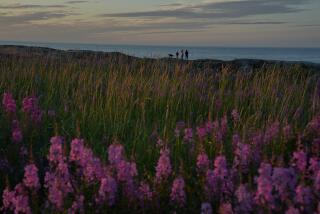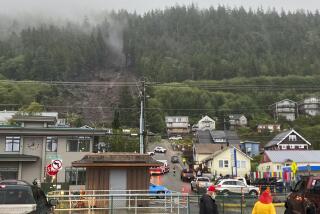Sen. Lisa Murkowski: Alaska ‘road to nowhere’ is actually a lifesaver
To a non-Alaskan unfamiliar with the harsh realities of living in remote corners of the nation’s largest state, the proposed link of two small towns whose populations barely total 1,000 people may seem like a “road to nowhere.”
Unfortunately, former Interior Secretary Bruce Babbitt’s March 11 commentary in The Times reflects this unsympathetic thinking. His delusive comments don’t change the fact that this small, lifesaving road would provide the people of King Cove, Alaska, with access to medical care in emergencies.
When the federal government created the Izembek National Wildlife Refuge 54 years ago, it cut off the traditional land route between the Aleut community of King Cove and the World War II-era outpost of Cold Bay on the Alaska Peninsula. The 965 residents of King Cove have been trying to get road access to the all-weather airport in Cold Bay ever since.
ABOUT BLOWBACK: FAQs and submission policy
It’s not hard to understand why: Nineteen people have died, either in plane crashes or because they couldn’t get timely medical treatment. In a community with no hospital or doctor, King Cove residents must fly more than 600 miles to Anchorage for most medical procedures.
Babbitt evidently believes that the price of this road is too high to protect so few souls, and that federal taxpayers would be on the hook for the costs. He’s off-base on both counts. Yes, the road would traverse a federally protected wilderness area, but let’s face it: Birds and bears are not more important than people. And the federal government need only approve the road, because the state and the Aleutians East Borough have pledged to build and maintain it.
Babbitt also makes much of the taxpayer dollars previously spent on alternatives to a road. But his personal favorite -- a hovercraft -- only proves his opening declaration that “nothing dies harder than a bad idea.” The water in Cold Bay is too rough for the hovercraft more than 70% of the time. Had the Clinton administration approved a road in 1998, as Alaska’s congressional delegation sought, the federal government would have saved a lot of money.
PHOTOS: Obamacare -- and 8 other bungled launches
Another suggestion, that a road would be “impassable” during winter storms, is nonsense. Life in Alaska doesn’t stop when a few storm clouds gather overhead. We can drive through snow quite well, and it’s a lot easier than navigating a small boat through high seas.
Perhaps most offensive is Babbitt’s attempt to brand this as a “road to nowhere.” For local residents, it would be a road to somewhere -- and that somewhere would be lifesaving medical treatment.
Babbitt has no concept of the realities that King Cove residents face. They would not have spent decades fighting for this road if it were not crucial to their survival. People have died trying to make it from King Cove to Cold Bay during foul weather, and others have been forced to endure prolonged pain and suffering.
King Cove is not asking for a superhighway, but instead 11 miles of road through an area the Aleut stewarded for thousands of years before the government came along. It would be a gravel road, one-lane, and all of 13 feet wide.
The road would hardly be unprecedented either. There are 4,900 miles of roads in “refuges, waterfowl production areas, and hatcheries” throughout the country. The U.S. Fish and Wildlife Service proudly displays photos of several of them on its “Roads and Trails Program” Web page. The Izembek National Wildlife Refuge alone has some 50 miles of roads, built by the military during World War II and used today by federal employees and visiting duck hunters.
If you still somehow think this road is a bad idea, consider this. In exchange for it, the state of Alaska and the local tribal organization are offering 61,000 acres to the refuge, including new federally designated wilderness. That’s a 300-to-1 trade in the federal government’s favor. If environmental protection is the goal here, it’s hard to imagine a better deal.
Babbitt’s cavalier dismissal of King Cove’s plight is shameful. The next time he and others so unsympathetic of those who would benefit from this project drive around the roads in their communities, they should consider what it would be like if none could take them to emergency care. They ought to think about why they are trying to deny anyone such protection -- as the Interior Department has in King Cove, Alaska.
ALSO:
North Korea 2014 meets Rome AD 65
Is ‘Duke porn star’ Belle Knox a feminist or a troubled young woman?
Sen. Lisa Murkowski is Alaska’s senior senator and the ranking Republican on the Senate Energy and Natural Resources Committee and the Interior appropriations subcommittee.
More to Read
A cure for the common opinion
Get thought-provoking perspectives with our weekly newsletter.
You may occasionally receive promotional content from the Los Angeles Times.










